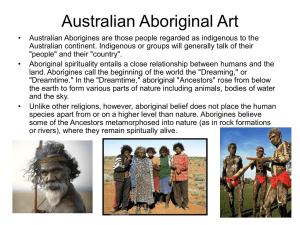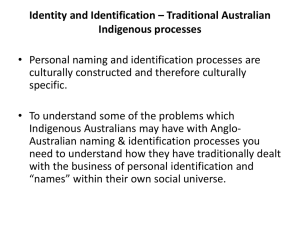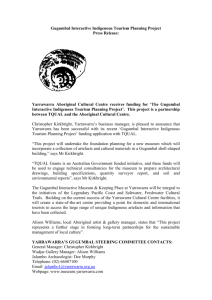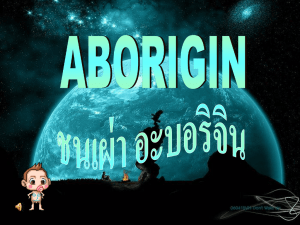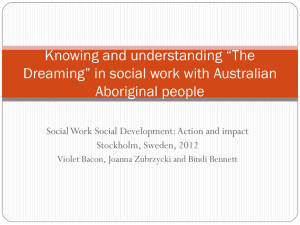March 2013 newsletter - Australian Indigenous HealthInfoNet
advertisement
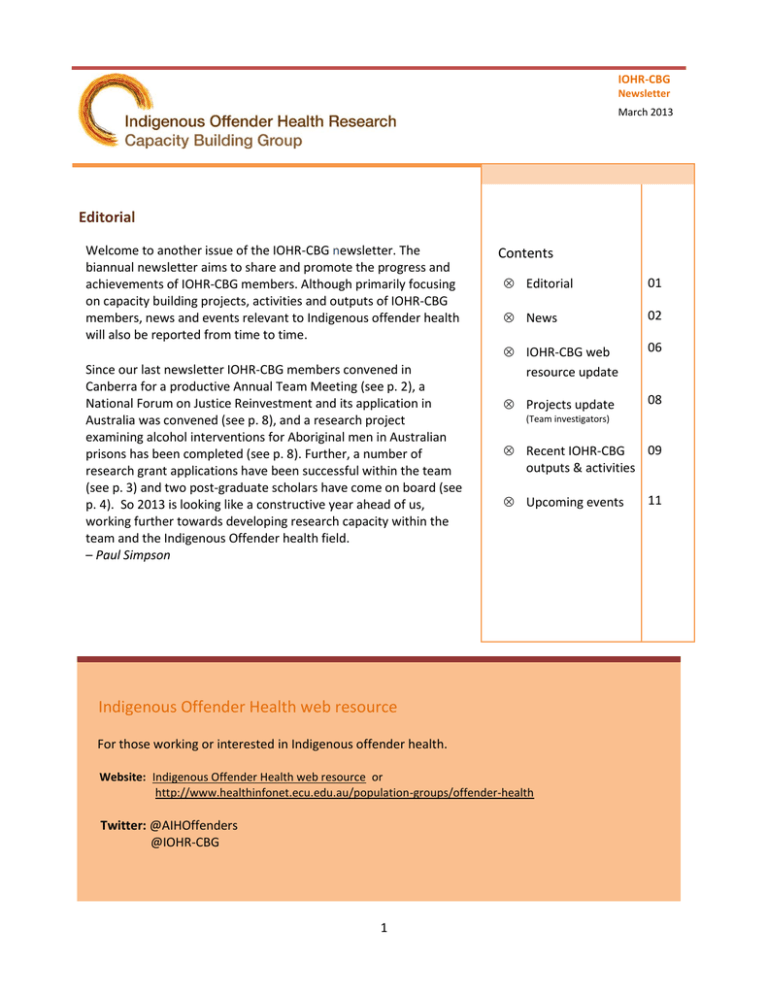
IOHR-CBG Newsletter March 2013 Editorial Welcome to another issue of the IOHR-CBG newsletter. The biannual newsletter aims to share and promote the progress and achievements of IOHR-CBG members. Although primarily focusing on capacity building projects, activities and outputs of IOHR-CBG members, news and events relevant to Indigenous offender health will also be reported from time to time. Since our last newsletter IOHR-CBG members convened in Canberra for a productive Annual Team Meeting (see p. 2), a National Forum on Justice Reinvestment and its application in Australia was convened (see p. 8), and a research project examining alcohol interventions for Aboriginal men in Australian prisons has been completed (see p. 8). Further, a number of research grant applications have been successful within the team (see p. 3) and two post-graduate scholars have come on board (see p. 4). So 2013 is looking like a constructive year ahead of us, working further towards developing research capacity within the team and the Indigenous Offender health field. – Paul Simpson Contents Editorial 01 News 02 IOHR-CBG web resource update 06 Projects update 08 (Team investigators) 09 Recent IOHR-CBG outputs & activities Upcoming events Indigenous Offender Health web resource For those working or interested in Indigenous offender health. Website: Indigenous Offender Health web resource or http://www.healthinfonet.ecu.edu.au/population-groups/offender-health Twitter: @AIHOffenders @IOHR-CBG 1 11 NEWS 2012 IOHR-CBG Annual Team Meeting – Canberra IOHR-CBG Annual Meeting in Canberra, Left to Right (Left picture): Megan Williams (UNSW), Nerelle Poroch (Winnunga Nimmityjah Aboriginal Health Service), Jill Guthrie (NCIS, ANU),Phyll Dance (NCIS, ANU), Ted Wilkes (NDRI). Left to Right (Right picture): Megan Williams (UNSW), Jill Guthrie (NCIS, ANU), Peter Schofield (University of Newcastle),Tony Butler (Kirby Institute, UNSW), Michael Doyle (Kirby Institute, UNSW), Mandy Wilson (NDRI), Nerelle Poroch (Winnunga Nimmityjah Aboriginal Health Service). September 2012 - IOHR-CBG members convened in Canberra for the Annual Team Meeting for the project From Broome to Berrima: building capacity Australian wide in Indigenous offender health research. Chaired by Mick Dodson, the day was well-attended by representatives from the project’s three research hubs: National Drug Research Institute (NDRI) WA, National Centre for Indigenous Studies (NCIS) ACT, and the Kirby Institute, NSW. Tony Butler welcomed to the team new project coordinator Paul Simpson. Paul gave a project update and presented project governance, management and budgetary reports. Project updates and capacity building journeys were presented by IOHR-CBG team investigators: Megan Williams (Muru Marri Indigenous Health Unit, UNSW) spoke about her PhD journey. Megan’s PhD explores the ways urban Aboriginal families and service providers support their loved ones post-prison release. Megan also spoke of other projects she is involved in including the Mad Bastards project (see p. 5). Michael Doyle (Kirby Institute) presented and reported plans to submit his Master’s thesis on Alcohol and other drug programs for Aboriginal men in Australian prisons, in the coming weeks (see p. 8). Jill Guthrie presented on capacity building related activities. Recent highlights included: the Justice Reinvestment forum held in Canberra in August (see p. 8), Journal of Australian Health publication with co-author Michael Levy on H1N1 Surveillance (Influenza control) at an Australian prison (see p. 9 to access article), the ACT working group on Justice Reinvestment, and submitting an ARC Discovery Indigenous Application for a NSW-based Justice Reinvestment project (see p 3). Mandy Wilson of NDRI spoke of the challenges and highlights of the Social and Cultural Resilience of Aboriginal Mothers in Prison Project, which she is working on with IOHR-CBG member Jocelyn Jones of NDRI and the University of Western Australia. Paul Simpson presented on a project developed with Jill Guthrie, Michael Doyle, Jocelyn Jones, and Tony Butler and Gavin Mooney that will assess the public’s views to incarceration versus nonincarceration alternatives (such as Justice Reinvestment) using a Citizens’ Juries approach (see p. 3). Paul also presented a progress report on the Indigenous offender health web resource , compiled by the Australian Indigenous HealthInfoNet. Nerelle Poroch presented her research with Winnunga Nimmityjah Aboriginal Health Service that looked at the needs of Aboriginal and Torres Strait Islander people in the ACT Alexander Maconochie Centre and their families and spoke about the capacity building workshop for research interviewers. Mandy Wilson and Paul Simpson also reported that they have begun analysing interviews from the Sexual Health Attitudes Australian Prisoners (SHAAP) study. Focus of the analysis will be on the experiences of transgender and sistergirl prisoners in relation to prison policy areas of placement, health services and every-day management. The second half of the day focused on future capacity building activities: The team discussed the idea of establishing 2 post-graduate scholarships. Tony Butler reported on the various funding applications within the offender health area that if successful will provide good opportunities for team investigators to further build and consolidate their research capacities. One highlight was the Centre for Research Excellence (CRE) application which presents a plan to establish a national CRE in offender health. The establishment of this centre would be unique in Australia and internationally, and will advance research and policy in this area, as well as improving health outcomes for this population group. It will provide new knowledge, build capacity in early and emerging researchers, and address 2 policy-relevant questions relating to violence, alcohol use, Aboriginal health, disease burden, the threat posed by infectious diseases, and diversion away from prison and into treatment and other non-incarceration alternatives. The next IOHR-CBG annual team meeting is planned for September/October 2013 (exact date to be determined) and will be held in Perth. 2012 Annual Team Meeting in Canberra, Left to Right: Phyll Dance (NCIS, ANU), Ted Wilkes (NDRI), Peter Schofield (University of Newcastle), Mick Dodson (NCIS, ANU), Tony Butler (Kirby Institute), Dennis Gray (NDRI) Successful funding applications among IOHR-CBG members Justice Reinvestment: A NSW-based exploratory study Justice Reinvestment has been gaining attention among Indigenous, health and offender advocates and is seen as a possible solution to Indigenous over-representation in Australia’s criminal justice system. However, what is missing is the evidence to support Justice Reinvestment beyond appealing rhetoric – evidence that can facilitate public debate and policy attention among politicians. Jill Guthrie has been successful in obtaining an Australian Research Council 2013 Discovery Indigenous award to explore Justice Reinvestment. With IOHR-CBG members, Mick Dodson, Michael Levy, Tony Butler and Phyll Dance, the research – a 3 year exploratory case study − aims to identify the conditions, governance structures and cultural appropriateness of reinvesting resources otherwise spent on incarceration, into holistic health services that could enhance juvenile and young offenders’ ability to remain and realise their human potential in their community. It will also undertake cost- effectiveness analysis of current spending on incarceration and cost-benefit analysis of adopting a justice reinvestment approach with the case study community. Reducing Australia’s Aboriginal prisoner population using Justice Reinvestment – assessing the public’s views to incarceration versus non-incarceration alternatives using a Citizens’ Jury approach A challenge to a Justice Reinvestment (JR) type approach, that was identified for further investigation at the 2011 AIATSIS workshop convened by Jill Guthrie in the ACT, relates to populist “tough on crime” policies. The impression of little sympathy for offenders among the general public is used by politicians to perpetuate punitive penal policies. Yet there has been little in-depth research into what the public actually think of non-incarceration alternatives like JR. IOHR-CBG members Jill Guthrie, Michael Doyle, Jocelyn Jones, Paul Simpson and Tony Butler have been successful in their application for Lowitja Institute project funding to explore the public’s views on how to treat offenders. Specifically, the project seeks to determine, through a qualitative research method called ‘Citizens’ Juries’, the opinions and views of a critically informed public towards alternatives to incarceration such as JR. It also examines whether policy makers’ are influenced by the opinions and views of the Citizens’ Juries. This research will provide important evidence in the offender health area and contribute to the JR debate among offender health, criminal justice, political and community stakeholders. View Lowitja project page Juvenile Offender Sexual Health (JOSH) Young Indigenous and non-Indigenous Australian offenders aged 14-15 years have never been systematically surveyed regarding their sexual and reproductive health. Similarly, there are no data available on sexual and reproductive behaviours among adolescents aged 14-15 years in the community. A NHMRC funding application was successful for IOHR-CBG members Tony Butler and Megan Williams to undertake research in the sexual and reproductive behaviours of young offenders (14-18 years). Lorraine Yap and Basil Donovan of the Kirby Institute, and James Ward (Baker Institute / Kirby Institute) are also project team members. The five year project was the third largest funded within UNSW in the current round of NHMRC project funding. It will be the first research into the 3 sexual health and related behaviours of young people in custody in Australia, collecting data from NSW and Queensland. This research will inform policy and public health responses targeted at this highly vulnerable group. Reducing Impulsivity in Repeat-violent offenders using an SSRI (REINVESt) Considerable evidence exists to suggest that impulsivity is a behavioural characteristic underpinning much offending behaviour, particularly violent offending. IOHR-CBG members Tony Butler and Jocelyn Jones have been recently awarded a NHMRC Partnership Grant to determine if a pharmacological treatment which reduces impulsivity in impulsive, repeat-violent offenders - may demonstrate benefits in terms of both reducing violent re-offending and provide indirect evidence-based support for the consideration of brain pathology in determining the fate of offenders. As part of the planning for this study a poll of NSW prisoners was conducted to ascertain their interest in participating in such a study. Many reported they were interested in receiving treatment likely to enhance their selfcontrol and potentially reduce their contact with the criminal justice system. To our knowledge, no studies have determined the level of interest among repeat-violent offenders to receive a drug that might assist them in dealing with impulsive urges. Welcome Lise Lafferty and Dina Saulo! A warm welcome goes out to our two new postgraduate Lise, under the supervision of Tony Butler, Jill Guthrie and scholars Lise Lafferty and Dina Saulo who have joined Georgina Chambers, will be undertaking her PhD research the IOHR-CBG. at the Kirby Institute looking at PTSD treatment of Dina is a Master of Applied Epidemiology scholar with Indigenous prisoners. Lise’s research will focus on a costthe National Centre for Epidemiology & Population benefit analysis of treatment in custody measured with Health at ANU. Dina’s field placement during her post-release outcomes. PTSD is the most common mental candidature will be at the Kirby Institute. Dina has illness reported among prisoners. Lise holds a Master of previously worked at the Aboriginal Health and Medical Indigenous Studies and a Master of Social Development Research Council of NSW (AH&MRC) where she through the University of NSW and is currently involved in coordinated the NSW Aboriginal sexual and reproductive the NSW arm of the Social and Cultural Resilience and health program. Dina has had experience working with a Emotional wellbeing of Aboriginal Mothers in prison number of marginalised populations in a public health (SCREAM) research project. capacity with a particular focus on sexual health, STIs, BBV & HIV/AIDS. Lise Lafferty Dina Saulo Increasing profile of Justice Reinvestment at Federal level Senate inquiry into the value of a justice reinvestment approach in Australia There will be a Senate Inquiry to investigate the value of a justice reinvestment approach to criminal justice in Australia. On 26 November 2012 the Senate referred the matter to the Legal and Constitutional Affairs Committees for inquiry and report. Led by Jill Guthrie, a joint submission will be made by the IOHR-CBG, the National Centre for Indigenous Studies, and the Justice Reinvestment Research Group. Inquiry and submission details 4 Senate adjournment speech acknowledges IOHR-CBG members IOHR-CBG work continues to make an important contribution to Justice Reinvestment public discourse. This was evidenced most recently by Senator Penny Wright’s Adjournment speech to Parliament about Justice Reinvestment where the Senator cited the work of IOHR-CBG members Jill Guthrie, Tony Butler and Michael Levy. View speech Sad loss of Gavin Mooney IOHR-CBG members were shocked and deeply saddened by the tragic death of Gavin Mooney and Delys Weston in December. As a health economist Gavin saw beyond the dollars and cents to the real impacts of illness, disability and disadvantage. Just recently Jill Guthrie, Tony Butler and I had the privilege of working with Gavin on the Citizens’ Jury (CJ) pilot assessing the public’s views on non-incarceration alternatives (see below). Gavin’s passion and commitment to the CJ approach struck me as inspiring. He made his CJ book available online without cost to ensure that it was accessible to everyone working or interested in health. It is a shame that IOHR-CBG members and the wider community will not have the opportunity to learn further from Gavin, as there was much to learn from him. Gavin will be remembered for his commitment to, and passionate advocacy for, equity and social justice surrounding Indigenous health and for championing citizens’ juries. We plan to continue his ground-breaking work in citizens’ juries in the offender health area, to which Gavin was so instrumental. Gavin and Delys will be missed by all who knew and worked with him. – Ed Eulogy and tributes (intouch – PHAA newsletter Feb 2013): http://www.phaa.net.au/documents/Feb2013.pdf Rest in Peace Gavin Mooney and Del Watson (Gavin Mooney website): http://www.gavinmooney.com/ Offender health Citizens’ Jury – Sydney pilot In recent years there has been increasing interest in involving communities in decision making in health and health care through various forms of ‘deliberative democracy’. Citizens’ Juries (CJ) are one such approach and have been used in various policy fields internationally, including in health in Australia. They involve bringing together a randomly selected group of citizens, giving them good information on the issues to hand and asking them, as representatives of the community, about their preferences for certain policy options or priorities for resource allocation. As far as we are aware CJs have not been used before in Australia in the offender health area. A pilot CJ facilitated by the late Gavin Mooney was conducted in Sydney recently to evaluate the CJ approach within an offender health context. The jury was ‘charged’ with considering what principles they wanted to underpin the treatment of offenders and to consider how best these principles might be put into practice. A CJ recommendations report was produced outlining three main identified principles: 1) punishment as a function of specific crime committed and the socio-economic context of the individual; 2) prevention informed by mentoring/education and addressing structural impediments; and 3) the principles behind the treatment of offenders to be informed by a critically informed public. The jury agreed that a form of Justice Reinvestment would best allow the first two principles to be enacted. Evaluation findings showed that 10 from 11 participants indicated high level of satisfaction with the recommendations report reflecting jury member’s views. Evaluation survey results also indicated that overall participants responded favourably to the CJ event feeling that: their views counted and were respected; they were making a valued contribution; and they gained new knowledge and perspectives of offenders. The recommendation report and pilot evaluation results will allow project members to refine the CJ methodology, and indicate that CJs have productive potential within the offender health area. ‘Mad Bastards’ program successfully piloted in communities The Mad Bastards Community Outreach Program and the Mad Bastards Guide: Be the Best You Can Be, build on the success of feature film Mad Bastards. The film speaks to all of the key issues facing Aboriginal men and their relationships, as sons, uncles and partners, as well as issues that inhibit transmission of culture including incarceration, violence and alcohol abuse. Writer and director Brendan Fletcher, and Aboriginal musicians Pigram Brothers, received many requests for film screenings and discussions with cast and crew. A Working Group subsequently developed a Community Outreach Program, designed to leverage the film content, to hold culturally 5 safe dialogues about ways to strengthen local cultures, skills and identity. Particularly beneficial is the combination of Mad Bastards film images, music, stories and script dialogue with questions and tools for drawing out film themes in a cultural group context. Community feedback has described this activity as “one of the few really resonant resources that speaks intimately to Indigenous men on a level they can relate to”. Three pilot events were held in late 2012. These events were held in partnership with Gamarada Men’s Self-Healing in Redfern, Medicare Locals ‘Deadly Dads’ program in Tathra, and as part of the Mibbinbah national camp at Mt Keira, NSW, attended by close to 100 Aboriginal & Torres Strait Islander males from across Australia. As per good practice, feedback from these pilot events informed the ongoing development of the resource. News of the program’s development has continued to spread via word of mouth. Funding is currently being sought to meet demand for screenings and discussions – from more than 60 communities across Australia. An ideal research project... Get in touch if you would like to be involved – contact details below. The Mad Bastards Working Group is made up of a number of Aboriginal people with significant experience across community, medical and tertiary sectors. Our group is ongoing and comprises of Associate Professor Mark Wenitong (National Aboriginal Community Controlled Health Organisation and James Cook University), Al Harris (Magpie Media), Megan Williams (Muru Marri Indigenous Health Unit, School of Public Health and Community Medicine, UNSW), Ken Zulumovski (Gamarada Men’s Self-Healing Program), Professor Alex Brown (Indigenous Health Research, South Australian Health and Medical Research Institute), Dr Brian McCoy (Aboriginal and Torres Strait Islander Health Unit, Faculty of Health Sciences, La Trobe University) Brendan Fletcher (Bush Turkey Films, Director of Mad Bastards film), Jack Bulman (Mibbinbah), Antony Stockdale and Christina Grant (The Republic). - Mad Bastards Working Group 2013. - Contact Megan Williams at megan.williams@unsw.edu.au or mobile 0400 073 358 -------------Mad Bastards Working Group and IOHR-CBG member Megan Williams states that ‘themes emerging from her PhD research into community and family support for Aboriginal people post-prison release are well depicted in the Mad Bastards film and program’. Her findings and understandings have been simultaneously presented to, discussed by, and further developed in the context of the Mad Bastards Working Group, showing how knowledge exchange is impossible to divorce from the research process¹. ¹ From Wangka Pulka newsletter, issue 7, 2012. Retrieved from: http://www.lowitja.org.au/wangka-pulka-newsletter-august-2012 Indigenous offender health web resource update Website: Indigenous Offender Health web resource There were 204 new entries for the Offender Health website between Jul and December 2012. Ninety seven of these were publications and 46 new programs/projects, so worth visiting if you haven’t done so recently. Entry type Publications Resources Policies & strategies Organisations Programs & projects News items Conferences and events Number of new entries Jul-Dec 2012 97 6 11 10 46 21 13 New publication entries to the offender health web resource: Re-imagining youth justice: cultural contestation in the Kimberley region of Australia since the 1991 Royal Commission into Aboriginal Deaths in Custody. Click here 6 Assessing the influence of "standard" and "culturally specific" risk factors on the prevalence and frequency of offending: the case of Indigenous Australians. Click here An economic analysis for Aboriginal and Torres Strait Islander offenders: prison vs residential treatment. Canberra: Australian National Council on Drugs. Click here The labour supply of Indigenous Australian females: the effects of fertility and interactions with the justice system. Click here Gender, Indigeneity, and the Criminal Courts: A Narrative Exploration of Women's Sentencing in Western Australia. Click here Report on Government Services 2013. [Profile of corrective services see Volume 1: Early childhood, education and training; Justice; Emergency management, Section 8). Click here 2013 Indigenous offender health review update Planning has begun for the annual minor update of the Review of Indigenous offender health. It is anticipated that the update will be completed by the end March and will be made available on the offender health section of the AIH website. A plain language version will also be compiled in April. IOHR-CBG newsletter – now available online Previous and current versions of the IOHR-CBG newsletter will now be publically available from the index page of the offender health site. This provides an accessible platform to promote the advancements and achievements of IOHRCBG members and other Indigenous offender health news and projects. The newsletter comes with a stand-alone url (http://www.healthinfonet.ecu.edu.au/population-groups/offender-health/iohr-cbg-newsletter). To subscribe to the newsletter (and receive it by email) contact Paul at: psimpson@kirby.unsw.edu.au Web resource usage – dramatic increase by 42-57% during Jul-Dec 2012 Visits: Visits refers to the number of times an individual user accesses the website. From July to December 2012 there were 1,725 visits to the offender health web resource. In comparison to the same time period the previous year, visits have increased by 42%. Page views: Page views refer to the number of times a page is loaded in a web browser. From July to December 2012 there were 3,528 page views to the to the offender health web resource. In comparison to the same time period the previous year, page views have increased by 57%. Figure 1 Visits to the offender health section, 1 July to 31 December 2012 (blue), and 3 July 2011 to 2 January 2012 (orange) 7 Projects update IOHR-CBG Team Investigators Congratulations goes to Michael Doyle who was awarded a Master in Public Health degree based on his research examining alcohol interventions for Aboriginal men in Australian prisons. Michael’s qualitative research found that despite there being alcohol and other drug (AoD) programs in prisons in every state/territory, there have been no published evaluations of such programs between 2005 and 2010. Furthermore, the vast majority of prison based AoD programs were found to be for people in prison as a collective group, with only three Indigenous specific programs. This is despite it being recognised that Indigenous people are a significant group within the prison population and that any work with this group should be undertaken in a culturally appropriate way. Findings also suggested that it is difficult to recruit and retain Aboriginal staff including qualified staff to regional locations. Additionally, there are also language difficulties, as well as other considerations when delivering AoD programs to Indigenous men in prison. Michael is currently working towards publishing a paper based on this research. Michael has also begun a PhD candidature at the Kirby Institute under the supervision of Tony Butler (Kirby Institute), Jill Guthrie (NCIS) and Anthony Shakeshaft (NDARC). Michael’s PhD research will look at problematic use of alcohol and related other drug use among Aboriginal and Torres Strait Islander men in the offender population. Michael Doyle speaks about his Master’s research journey coming to an end at the 2012 IOHR-CBG Annual Team Meeting in Canberra. Justice Reinvestment forum in Canberra asking ‘Is Justice Reinvestment needed in Australia? Jill Guthrie continues her leading work in the Justice Reinvestment area. Following the November 2011 workshop exploring the feasibility of JR in the ACT, Jill convened a JR forum in August 2012 that discussed JR’s application in Australia, from a panel of national and international experts in the field. The forum was co-hosted by NCIS, IOHR-CBG, and the Crawford School of Public Policy at the ANU College of Asia and the Pacific The aim of the Forum was for all participants to learn more about Justice Reinvestment and gain some shared understandings of its implementation in other countries. Michael Levy (Director of Justice Health Service in the ACT and IOHR-CBG member) facilitated. Speakers included: Tony Butler (Head, Justice Health Research Program, Kirby Institute and IOHR-CBG member) who provided a description of Australia’s incarceration profile; Tom Calma (former Aboriginal and Torres Strait Islander Social Justice Commissioner) who spoke on the Justice Reinvestment movement in Australia; Mick Dodson (Director NCIS and IOHR-CBG member) who spoke about the 20 years since the Royal Commission into Aboriginal Deaths in Custody; Andrew Coyle and Vivien Coyle who both spoke on how Justice Reinvestment has been implemented in the United Kingdom; Todd Clear who spoke on the promise and perils of Justice Reinvestment. More information about this forum including presentations, reports and audio, go to NCIS events. Also following the November 2011 forum, a working group was formed comprising the ACT Human Rights Commission, the local Indigenous elected Body, ACT Chief Minister’s department, ACT Department of 8 Community Justice, and NCIS academics Cressida Fforde and Jill Guthrie. The group has met several times over 2012 to undertake development work that will lead towards submitting an ARC research application later this year to do an ACT-based JR research project. Jill was also successful in obtaining an Australian Research Council 2013 Discovery Indigenous award for a 3 year exploratory case study looking at Justice Reinvestment in a NSW regional town (more information see p. 3). Jocelyn Jones’ doctoral research exploring Juvenile Justice pathways in Aboriginal and Torres Strait Islander children is expected to be competed towards the end of 2013. Jocelyn also continues her work on the WA arm of the Social and Cultural Resilience and Emotional wellbeing of Aboriginal Mothers in prison (SCREAM) research project. Megan Williams’ PhD on Aboriginal families and social support post-prison release is also anticipated to be completed later this year. Megan is also a teaching ‘Aboriginal and Torres Strait Islander Health Across the Lifespan’ and ‘Case Studies in Aboriginal and Torres Strait Islander Health’ for an Aboriginal Medical Service of Western Sydney student cohort. Recent offender health publications & reports by IOHR-CBG members Team Investigators Guthrie. J., Lokuge K., & Levy, M. (2012). Influenza control can be achieved in a custodial setting: Pandemic (H1N1) 2009 and 2011 in an Australian prison. Public Health, 126(12), 1032-1037. Click here Guthrie, J. A. (Ed.) (2012). Is Justice Reinvestment Needed in Australia?’ Edited transcript of a one-day forum held on the 2nd of August, 2012. Click here Guthrie, J. (2012). Estimating the magnitude of potentially avoidable hospitalisations of Indigenous children in the Australian capital territory: Some methodological challenges [online]. Australian Aboriginal Studies, 1, 92-97. Click here Kariminia, A., Butler, T., Jones, J. & Law, M. (2012), Increased mortality among Indigenous persons during and after release from prison in New South Wales. Australian and New Zealand Journal of Public Health, 36: 274–280. Click here Chief investigators & mentors Butler, T., Richters, J., Yap, L., & Donovan, B. (2012). Condoms for prisoners: no evidence that they increase sex in prison, but they increase safe sex. Sexually Transmitted Infections. Published Online First. Retrieved on 5th March 2013 doi:10.1136/sextrans-2012-050856 Click here Heffernan, E. B., Anderson, K. C., Dev, A., & Kinner, S. (2012). Prevalence of mental illness among Aboriginal and Torres Strait Islander people in Queensland prisons. Medical Journal of Australia, 197, 3741. Click here Kariminia, A., Butler, T., Jones, J. & Law, M. (2012), Increased mortality among Indigenous persons during and after release from prison in New South Wales. Australian and New Zealand Journal of Public Health, 36: 274–280. Click here Kinner, S. A., Dietze, P. M., & Alati, R. (2012). Prevalence and correlates of alcohol dependence in adult prisoners vary according to Indigenous status. Australian and New Zealand Journal of Public Health, 36(4), 329-334. Click here 9 Richmond, L., Butler, T., Indig, D., Wilhelm, K.A., Archer, V.A., & Wodak, A. W. (2012).The challenges of reducing tobacco use among prisoners (2012). Drug and Alcohol Review, 31, 625–630. Click here Conferences, seminars, symposia – attendance & presentations Michael Doyle presented as part of the National Aborigines and Islanders Day Observance Committee (NAIDOC) celebration at the Kirby Institute in July 2012. Michael Doyle and Simon Graham both spoke about their work at Kirby addressing very different aspects of Indigenous health. A report was printed documenting all the Indigenous health projects undertaken at the Kirby Institute. Click here to view report Jill Guthrie was keynote speaker on Justice Reinvestment at the Puzzle Integration Conference, Deakin University, Melbourne; July 2012. Jill also chaired the Indigenous session at the Public Health Association of Australia - Justice Health Conference, Canberra; August 2012. Megan Williams co-facilitated a workshop titled ‘How to support post-release transitioning’ at the Reducing Indigenous Youth Incarceration Criterion Conference in Sydney September 2012. Other new activities, committee, panel memberships etc., submissions, applications … Doyle, M. (2013). Indigenous reference group member for Reducing Impulsivity in Repeat-violent offenders using an SSRI (REINVESt) study, Kirby Institute, UNSW (see p. 4). Doyle, M. (2012-2013). Offender health Citizens’ Juries project member, Kirby Institute, National Centre for Indigenous Studies, and National Drug Research Institute. (see p. 3). Jones, J. (2013). Indigenous reference group member for Reducing Impulsivity in Repeat-violent offenders using an SSRI (REINVESt) study (see p. 4). Jones, J. (2012-2013). Offender health Citizens’ Juries project member, Kirby Institute, National Centre for Indigenous Studies, and National Drug Research Institute. (see p. 3). Williams, M. (2013). Indigenous reference group member for Reducing Impulsivity in Repeat-violent offenders using an SSRI (REINVESt) study (see p. 4). Williams, M (2012-2013). Mad Bastards Community Outreach Program Working Group Member (see p. 5). Williams, M. (2012). Aboriginal and Torres Strait Islander Reference Group member for the National Cannabis Prevention and Information Centre. , University of NSW, Sydney. Williams, M. (2012). Reference Group member, Aboriginal Community Participation Meeting, Determining the impact of opioid substitution therapy upon mortality and recidivism among prisoners: a 22 year data linkage study. National Drug and Alcohol Research Centre (NDARC), University of NSW, Sydney. Williams, M. (2012). Invited Panel Member – Courage Questions in Health Research, Congress Lowitja 2012 Knowledge Exchange and Translation into Practice. Melbourne Williams, M. (2011-2013). University of NSW ‘Link Person’ to the Lowitja Institute, incorporating the Cooperative Research Centre for Aboriginal Health. Guthrie, J. (2012). Justice Reinvestment Roundtable member (convened by Senator Penny Wright). Parliament House, Canberra. Sen Penny Wright Media release 10 Guthrie, J., with The National Centre for Indigenous Studies, & ACT Corrective Services (2013). Indigenous Justice Program Funding Application to do the research arm for implementing a Throughcare program for Indigenous detainees in the Alexander Maconochie Centre (outcome expected in April). Upcoming conferences, events The National Social Inclusion and Complex Needs Conference – Canberra 15-16 April 2013 This event will be the first Australian conference to showcase successful programs/approaches in addressing complex needs and social determinants of health - with the broader purpose of identifying what works and how. It has long been acknowledged that people with complex needs often fall through the cracks in service delivery - between national and jurisdictional service delivery, between government and non-government services, and between services delivered by different portfolio agencies. This conference seeks to identify and showcase successful collaborative efforts in service delivery, with a view to informing whole-of-government approaches to policy and program development. The conference will be an excellent opportunity to hear the most recent research and practitioner wisdom with a view to breaking down structural and systemic barriers to achieving better health and social outcomes for people with complex needs. With noted national experts from both government and non-government sectors showcasing their work, the conference aims to shed new light and consider current evidence about issues relevant to, and the challenges in seeking to, achieve better outcomes for people with complex needs in the Australian community. More info: PHAA Complex Needs Conference Human rights and policing conference – Canberra 16-18 April 2013 In April 2013, the ARC Centre of Excellence in Policing and Security (CEPS) will be holding a three day conference to commemorate the 50th anniversary of the original 1963 seminar. The 2013 conference will examine issues from the 1963 seminar, address the evolution of human rights since 1963, and also consider new topics of concern that did not confront law enforcement in 1963. These issues include: - discrimination (e.g. gender, race, disability) Indigenous concerns balancing human rights and security the role of modern policing corruption and ethics the differing structures of policing. More info: Human Rights and Policing Conference Public Health Association Australia (PHAA) 42nd annual conference – Melbourne 16-18 September, 2013 **Abstract submissions close Friday 15 March 2013. The theme of the conference is A 'fair go' for health: tackling physical, social and psychological inequality. The PHAA conference will bring together expert researchers, practitioners and policy workers who are taking action on social inequalities in health. The sharing of knowledge through keynote papers by leading international and national figures, and presentations of the latest Australian research, will be just the beginning. All those attending will also have the opportunity to learn about and contribute to the development of PHAA policy and advocacy on issues of current concern to public health. The three sub-themes for the conference are physical, social and psychological inequalities, and abstracts are invited on, but not limited to: inequalities in physical and natural environments - improving built and natural environments, climate change and food security psychological inequalities - promoting community mental health and wellbeing, and addressing health-related behaviours and psychology - social inequalities - addressing the social determinants of health. More info: PHAA 42nd Annual Conference 11 IOHR-CBG Annual Team Meeting - Perth Sep/Oct 2013 This event will present current and emerging research and projects by IOHR-CBG investigators and other Indigenous offender health researchers Program to be determined Any questions please contact Paul: psimpson@kirby.unsw.edu.au Other conferences Communicable Disease Control conference 2013 19-20 March 2013, Canberra 2013 Inaugural APS Health Psychology Conference 5-6 April, 2013, Cairns Other stories, reports, resources … Mental illness and cognitive disability in Aboriginal and Torres Strait Islander prisoners – a human rights approach by Mick Gooda Inside Out: The mental health of Aboriginal and Torres Strait Islander people in custody report –Queensland Forensic Mental Health Service, Queensland Health (PI Ed Heffernan). Any events, news, corrections, addendums, broken links etc please email Paul: psimpson@kirby.unsw.edu.au 12
